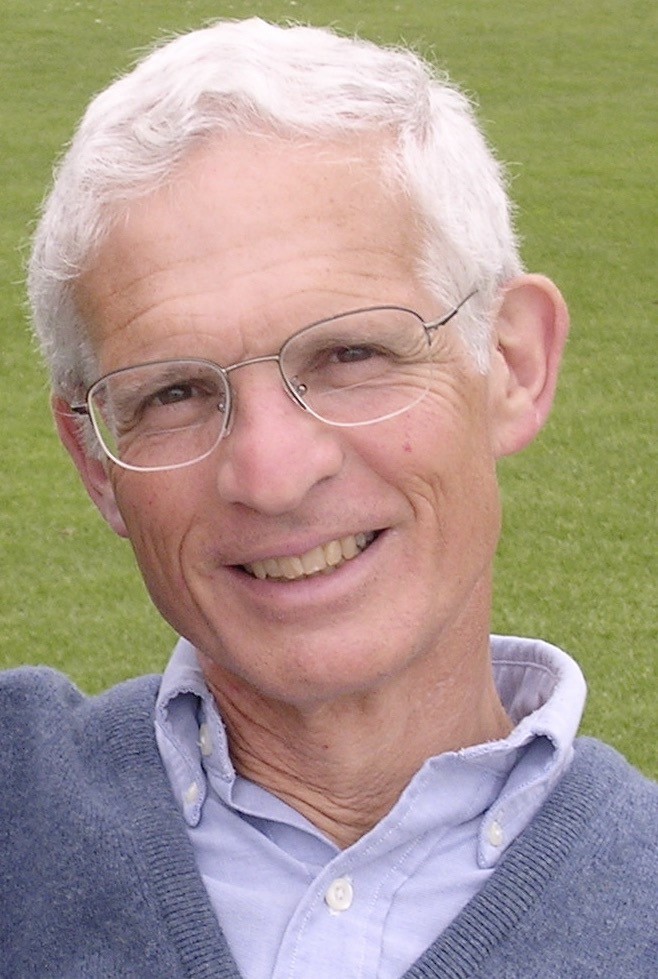Evolutionary biologist Rick Harrison dies at 70
By Krishna Ramanujan
Memorial service
There will be a memorial service for Rick Harrison in G10 Biotech Building on Saturday, Oct. 22; 3-5 p.m., with a reception to follow in the Corson-Mudd atrium.
Richard “Rick” Harrison, Ph.D. ’77, professor of ecology and evolutionary biology and a pioneer in his field, died unexpectedly April 12 while visiting Lizard Island, Australia. Harrison was 70 years old.
As a researcher whose expertise was both broad and deep in evolutionary biology and genetics, and as a mentor to students, Harrison’s impact was far-reaching.
In fact, his former students held a symposium to honor his 65th birthday in July 2010. The symposium, “Genetics and the Origin of Species: The Continuing Synthesis,” and dubbed “Rick Fest,” included more than 20 speakers, all of whom were alumni of Harrison’s lab, and the symposium was attended by more than 100 on Cornell’s campus. The focus was on research that explores the genetics behind the formation of new species, one of several scientific areas where Harrison made major contributions.
“Rick Harrison was one of the most influential evolutionary biologists of the past 50 years,” said Daniel Howard, Regents Professor of Biology and executive vice president and provost at New Mexico State University, and one of Harrison’s first graduate students at Yale. “Not only did he make fundamental contributions to our understanding of how new species are formed, he was a mentor without peer, training and influencing many of the leading evolutionists of our time.”
A few of his important works included studies of “hybrid zones” in the 1980s and a definition still used by researchers: “interactions between genetically distinct groups of individuals resulting in at least some offspring of mixed ancestry.” In the late 1980s, Harrison and his students conducted seminal work using mitochondrial DNA, and by the early 1990s, his research group was regarded as one of the leading mitochondrial DNA labs in the world.
Harrison answered questions about whether speciation (the formation of distinct new species) left a molecular genetic signature that could shed light on evolutionary processes during a speciation event. And he helped explain the factors that define a species.
His role as a mentor was regarded as being as relevant to his career arc as his research itself. In a special issue of the journal Genetica in 2010, which carried the “Rick Fest” symposium lectures, the introductory paper’s authors, led by Howard, noted: “There are few evolutionary biologists in the world who have trained more undergraduate and graduate students and postdoctoral fellows than Rick Harrison. … His influence as a mentor and colleague is so far-reaching that is difficult to identify anyone in the field who has not had some meaningful interaction with him.”
Harrison received a bachelor’s degree from Harvard University in 1967 and a Ph.D. from Cornell in 1977. He was a faculty member in biology at Yale University from 1977 to 1986 before he joined Cornell’s Section of Ecology and Systematics, later the Department of Ecology and Evolutionary Biology, which he chaired for many years.
“Rick has been a pillar in our department for so many years,” said Amy McCune, professor and chair of the Department of Ecology and Evolutionary Biology. “He was a superb scholar and scientist, he was both critical and open-minded, kind and compassionate, thoughtful and caring, and a much revered mentor and friend to many of us, faculty and students alike. Having been a graduate student in this department, when we hired him back from Yale, we gained a world-class intellect firmly rooted in the best of our traditions and values as a community.”
Ellen Harrison, his wife of 44 years, said her husband often encouraged his students to live full lives. He was true to his own advice, she said, noting that he enjoyed family, gardening, running, observing nature, wine collecting and star gazing.
Along with his wife, he is survived by two daughters, a brother and two grandchildren.
A memorial event is being planned for late summer or fall. Memorial contributions can be made to the Richard G. Harrison Graduate Student Research Fund. Checks should be made out to Cornell University and mailed to the attention of Carol Damm, Department of Ecology and Evolutionary Biology, Corson Hall, Cornell University, Ithaca NY 14853.
Media Contact
Get Cornell news delivered right to your inbox.
Subscribe